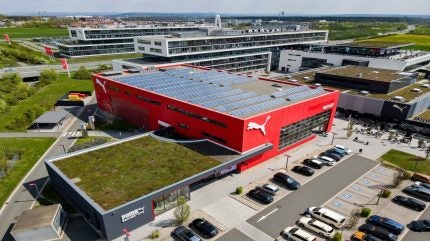
German sports company Puma has introduced its new Vision 2030, a set of sustainability goals aimed at enhancing the company’s impact across several key areas, including climate action, circularity, and human rights.
This new initiative builds on the progress the company has made in these areas and outlines a comprehensive plan for the future.
The goals focus on reducing Puma’s carbon footprint, promoting circular business models, and ensuring that human rights are upheld throughout the company’s global operations and supply chains.
Puma chief sourcing officer Anne-Laure Descours said: “With Vision 2030, we have elevated and evolved our current 10FOR25 sustainability goals to achieve impact on a larger scale across our business in climate, circularity and human rights. We are setting the bar higher to stay true to our responsibility to be FOREVER. BETTER. throughout our business, for people and the planet.”
By 2030, Puma aims to reduce its absolute Scope 1 and 2 greenhouse gas emissions by 90% from the 2017 baseline year. These targets have been approved by the Science Based Targets initiative (SBTi) as aligned with a 1.5° scenario.
Additionally, the company intends to cut absolute Scope 3 greenhouse gas emissions from its supply chain and logistics by 33% compared to 2017.
As part of its climate objectives for 2030, the company plans to increase renewable energy use at its core suppliers and focus on using less carbon-intensive materials.
Last year, Puma produced eight out of ten products from recycled or certified materials and is on track to meet its 2025 target of nine out of ten.
The same year the company cut emissions by 24% compared to 2022.
For 2030, circularity remains a top focus, with plans to expand circular business models and roll out resell and repair options in selected markets.
New material goals for 2030 include the use of 100% recycled polyester fabric.
In the apparel sector, 30% of the polyester fabric will be fibre-to-fibre recycled while 20% of cotton fabric will also come from recycled sources.
Puma intends to make an investment in next-generation material research options, particularly in footwear, and scale up textile-to-textile recycling.
Earlier this year, Puma announced it had produced replica football jerseys from recycled textile waste through its RE:FIBRE programme.
Puma’s 2023 Human Rights targets include closing the gender pay gap globally, promoting diversity, equity, and inclusion and training 400,000 workers in its supply chain.
The company also aims for progressive salary increases toward a living wage and a zero gender pay gap at core factories.
Earlier this month, PUMA reported a 5% increase in currency-adjusted sales for the third quarter of 2024, reaching €2.308bn.



